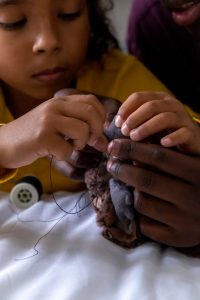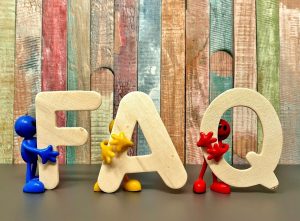Adoption Therapy
Adoption is one of the most loving things a parent can do. Taking a child that you didn’t know, who’s wounded, broken, and bruised can be one of the hardest and most amazing undertakings. And now, they are yours. No matter what comments people make about different genetics, appearances, etc. they (will) carry you name as well as your love.
Sometimes, kids can’t settle In.
Tantrums any time a parent says “no.” Inability to name emotions. Potty problems. Hyperactivity.
All these struggles can leave both parents and kids too exhausted to bond.
When kids come into your home wounded, the wounds often lash out or shut down. To let in love is often experienced as dangerous, even if they can’t say that. After all, even if your child was brought in at birth, they carry an implicit primal wound of rejection from the person who was most important to them. If they are older, likelihood is they may even have conscious memory of love and danger combined in the neglect and abuse that pulled them out of their parent’s home.
 Trauma during brain development doesn’t mean no hope.
Trauma during brain development doesn’t mean no hope.
While many biological parents don’t see huge struggles from their kids, the special needs of adoptees is not uncommon. With lots of patience and attunement, parents can learn how to meet their family member’s unique needs.
A child’s struggles isn’t a conscious choice to go against a parent.
When a brain develops under the threat of safety, a simple change of environment doesn’t necessarily then tell their brain that they’re safe. Even if your child started out calm, and now is struggling isn’t a sign of “rebellion.” Things like a new developmental stage or new life event can often spark the old pain awake.
Parents get exhausted too..
The challenge comes (and it will come!) when broken places come out through distance or unwanted behaviors in your home. When we promise to love people in their broken places, we also often forget how squishy sensitive our own broken places can be too. Your child, and their wounds will wound you where you’ve been wounded before, even if you haven’t been aware of it. It’s perfectly reasonable that you might develop secondary trauma or just emotional exhaustion.
 An adoption therapist supports the parallel paths of bonding and history for both parents and kids.
An adoption therapist supports the parallel paths of bonding and history for both parents and kids.
In our office, we’ll learn together how to help your family combine a new story with your own. We’ll walk with your pain of disappointment and attachment background, along with their pain. We’ll work the dual paths of attachment—parental patience, love, and learning to parent, and their ability to take in safe structure and love.
Adoption therapists focus on bonding.
The core goal of parenting an adopted child is attachment.
Attachment will calm the trauma and behavioral reaction, and build in a foundation to work out the cracks in their broken heart.
Our goal is to help you learn the unique aspects of parenting that come through learning to build fences and boundaries without barbs. From embracing their ethnicity and cultural story into your families, to adjusting parenting for trauma awareness, to finding compassion for birth parents, we hope to look at the whole story.
Call or email today if you want to chat more about your unique story or make an appointment.

Frequently Asked Questions:
What does a session “look like?”
In our office, we’ll both do play that focuses on building sensed safety and connection. Often, especially as we are treating bonding, I’ll ask both parents and kids to join in session. With older children, I’ll give them a choice or alternate between alone and with parents.
Sometimes, this will mean either my modelling just sitting down with freeplay. I coach you in responses to your children, guiding you through some of the symbolism of their play. Sometimes we might do some structured, silly games to build laughter and fun together.
Some sessions will be about parents. What do you need to fill your own attachment cup? What parenting strategies are working, and what’s not?
These sessions are strengths based. We want to build onto the good! For those of you who research different approaches, my primary staring point is Attachment Theory and Somatic Experience, and in practical steps I use a lot of Trust Based Relational Intervention and Theraplay concepts.
What if a child won’t “cooperate?”
Our goal is to help your child feel warm and safe. Therapy is NOT about obedience and performance. Sometimes, that means “I don’t know” and “No” will be their responses. Then, we back off and engage in their world. Maybe they bring in their toys. Maybe we do online in your house instead of my office or vice versa.
Getting well is a choice, even at their age.
But, making it feel safe to open doors to new sensations and welcomed into love, that’s the therapist and parent’s job. Together, we’ll work to find the best “in” for your child.
Overwhelmed as it is! Where’s the time and energy for therapy?
No kidding! It’s not easy to bundle up kids and go out to ANYTHING. Adoption Therapy is meant to be like a way station.
An adoptive mom told me that raising kids without check-ins is like running a marathon without stops for food and water. While it is possible to carry everything you need, it’s heavier and harder.
My goal is that you experience that you are not alone.
Community, tools and little helps will create more time and energy. How often you come may depend on how often you need a breath. I offer discounts to make it more affordable to come twice a week during those extra hard seasons. Then, when it gets easier again, we can back off as needed.
Why find a specialist rather than a general child therapist?
While any child therapist has a basic knowledge of development and parenting struggles, a specialist also has awareness to watch for unique elements of attachment and developmental struggles.
Adoption is a three-pronged specialty: trauma, attachment, and play therapy.
A “general practitioner” therapist just doesn’t have the time to focus in on every piece of struggle for every client… who can blame them?
As both a trauma and adoption specialist some things we will be watching for include:
- Attachment styles and patterns
- Sensory processing needs
- Cultural and family history considerations
- Where the nervous system is “stuck”
- What helps to build sensed safety and resilience
We also work from the assumption that because we are in a broken world, everyone has broken places. A unique aspect of attachment therapy is the seeking to hold a parent’s wounds alongside of their child’s pain. If you have biological children, we might also be asking questions about their adjustment in the change of your family’s life and daily patterns.
How To Know if A Therapist is a “Good Fit?”
Truth is you can’t really know ahead of time if someone’s right for you. As much as expertise, a good therapeutic relationship is also based on personality. Everyone’s unique. The only way you can know is to call or email to make an appointment and ask me more questions.